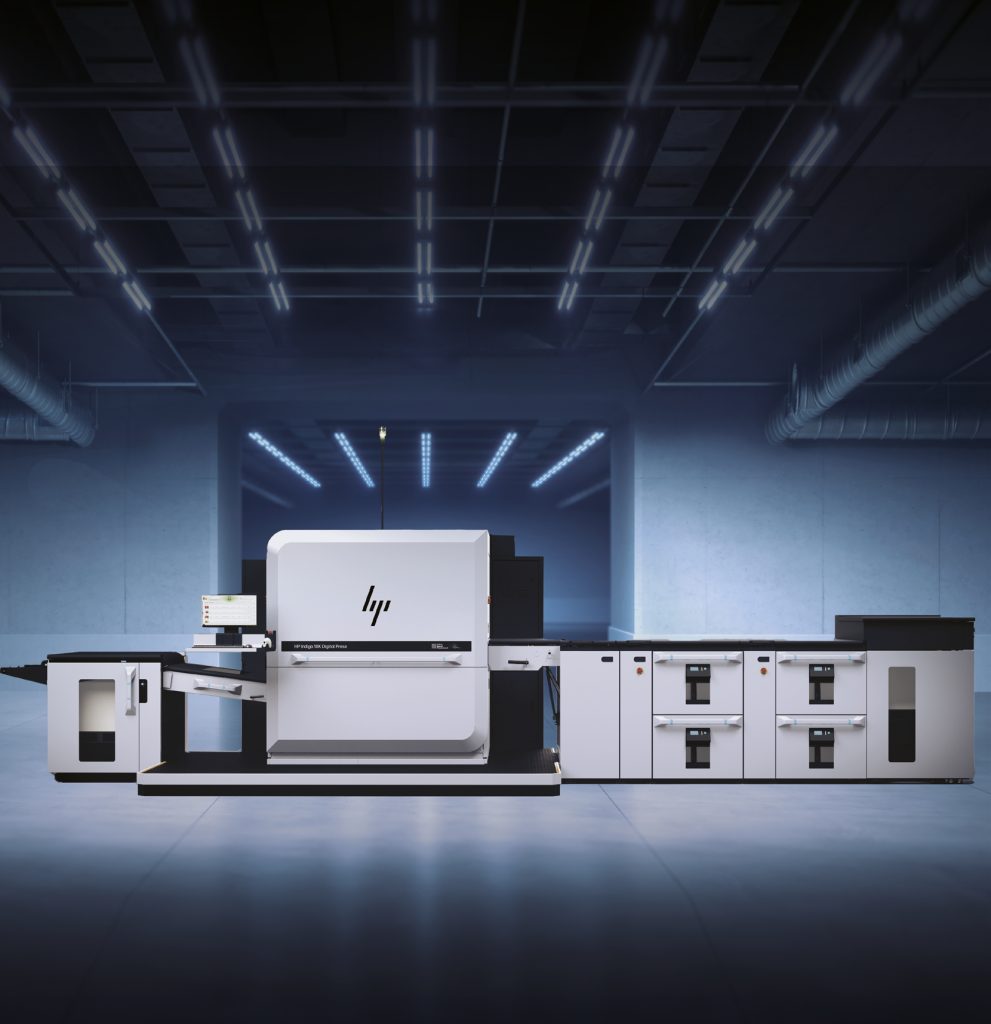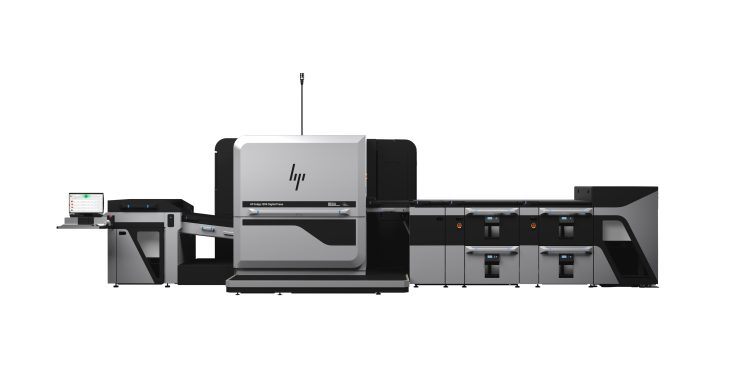HP announced three new digital presses leveraging HP Indigo’s cutting-edge LEP technology, along with an expanded portfolio of intelligent solutions digitizing the production floor. Optimizing productivity and versatility, TCO, and ease of use, this evolution effectively revolutionizes the way PSPs operate. The new offering represents HP’s commitment to the analog to digital transformation and the focus on the end-to-end production floor, designed to realize a new level of efficiency in print.
Targeting the needs of PSPs who must overcome frequent changes in the job basket, labor challenges and grow through increased productivity and diversification, HP takes its successful Series 4 and 5 to the next level with the introductions of the new generation B2 presses, the HP Indigo 120K Digital Press and the HP Indigo 18K Digital Press.
Continuing to unlock new growth opportunities, HP is also bringing a new approach to the security printing industry introducing today a new A3 sheetfed press, the HP Indigo 7K Secure Digital Press.
HP Indigo’s new portfolio delivers on the company’s analog-to-digital transformation strategy, which allows PSPs to enhance their production floor and achieve productivity, quality, and better economics without compromise. The new portfolio enables offset printers to convert more jobs to digital, allowing them to deliver on growing customer demands by developing a simplified, more efficient, and reliable production floor.
HP continues to push the industry forward, also announcing today the commercial availability of the HP Indigo V12 Digital Press following highly successful beta site installations including US-based digital and sustainable print leader, Brook + Whittle. The HP Indigo V12 Digital Press leverages new LEPx technology capable of replacing 2 flexo presses. Rooted in an industry-winning approach, the Indigo V12 is the fastest narrow web digital press on the market[i]. Analog to digital conversion increases the entire capacity of the production floor.
At drupa 2024 we are also showcasing the Indigo 35K HD Digital Press, the 2nd generation press dedicated to folding cartons. With its new HD writing head and higher LPI screens, it produces smoother tints, detailed small images, and micro text. This will be especially beneficial for finer graphics and images, particularly suitable for cosmetics packaging and security features required in pharma applications.
“I was deeply impressed to see HP Indigo’s new portfolio for drupa. HP Indigo’s vision of focusing on non-stop printing, economics, and automation perfectly aligns with Shutterfly’s needs. The combination of Indigo’s productivity alongside exceptional automation capabilities elevated our operational efficiency to new heights.” Dwayne Black, SVP & Chief Operations Officer, Shutterfly
High uptime, simpler interface and better economics with the HP Indigo 120K Digital Press
Reliability, high uptime, and fast production are critical to competing effectively in the global commercial print market. With the introduction of the new HP Indigo 120K Digital Press, HP sets a new standard for high-volume digital production through best-in-class productivity[ii]. The press brings a new approach to press innovation that champions uptime and reliability with the known Indigo quality.
“Our mission in the R&D labs in the last 3 years was developing a press that will deliver non-stop printing. A press that will be a game changer on productivity and TCO and will enable offset players to change their production floor” highlights Golan Landsberg, Head of R&D, HP Indigo.
The new ECO mode helps printers achieve improved economics and higher profitability thanks to increased uptime and reliability, while also lowering service costs by 20%. The ECO mode is a new print mode that reduces click price by intelligently creating a vivid image while using less ink. This new four-color print mode is complementary to the EPM and provides an economic solution for a wider application range.
Seamlessly integrating into any production floor, the HP Indigo 120K Digital Press enables flexible operation that optimizes the print ecosystem. The highly automated user experience reduces human touchpoints and enables multi-press operation by a single operator. The new press reaches demanding turnaround times with speeds of 6,000 sheets per hour[iii] and up to 90% press availability[iv]. Designed to deliver tens of thousands of B2 sheets every day, it produces over 2M B2 sheets per month.
 The HP Indigo 120K offers automated and streamlined operation with continuous feeding, continuous stacking (through Auto Pallet Replacement), and continuous color measurement. Printers can save valuable time with multiple input and output paper sources, allowing a seamless and automated switchover process for jobs and paper substrates.
The HP Indigo 120K offers automated and streamlined operation with continuous feeding, continuous stacking (through Auto Pallet Replacement), and continuous color measurement. Printers can save valuable time with multiple input and output paper sources, allowing a seamless and automated switchover process for jobs and paper substrates.
Shifting shorter jobs from analog to the HP Indigo 120K, PSPs can leverage all the environmental advantages of the digital printing process, which include eliminating aluminum consumption, and reducing paper waste and makeready time. In addition, with the new HP Indigo 120K ECO mode print option, printers can run jobs more economically and sustainably, reducing carbon footprint by 11%[v]. With a new user interface and different automation solutions, the 120K also simplifies the entire experience and enables less operator expertise.
“The HP Indigo 120K is a game changer. I have no doubts this press is the ultimate solution for any commercial print floor. The focus on productivity, economics, and ease of use is based on our customers feedback. This wasn’t a trivial direction for us but as the market leaders, we felt this was the path the industry is waiting for. with the first beta presses installations and the level of excitement we see on the field I think this is exactly the change that will accelerate the analog to digital transformation and increase the digital share on the market” Noam Zilbershtain, Vice President and General Manager HP Indigo and Scitex.
Unlocking new business opportunities in Commercial Printing with the HP Indigo 18K Digital Press
Built upon the legacy of the world’s best-selling B2 digital press[vi], the HP Indigo 18K Digital Press is the next generation in the versatility line, now more efficient, and easier to use, allowing printers to diversify their businesses and remain competitive. The new HP Indigo 18K’s versatility goes beyond the ability to produce specialty applications, seamlessly handling any mix of job types and substrates with ease and productivity to enable printers to unlock new growth opportunities.
The new press supports more than 2,000 certified substrates, three-quarters of which are sustainable media, and can flexibly accommodate different media thicknesses with exclusive duplex printing on thick substrates as well as smooth handling of light substrates. The press includes up to 7 color stations that can be loaded with a variety of specialty inks to create myriad combinations.
Upholding the highest standards of print quality with an offset look and feel, the HP Indigo 18K enables printers to achieve top image quality automatically through AI-based automation, HD Imaging[vii] which delivers exceptional smoothness and sharpness, and innovative Photo-Pro Mode which automatically applies CMYK+LLK inks on demand.
Designed to increase efficiency, the Indigo 18K simplifies operator experience through advanced AI tools that help users produce more jobs in a single shift and enable up to 80% press availability[viii]. Boosting press productivity while working in an Enhanced Productivity Mode (EPM) enables printing 4,600 color pages per hour, which translates into 33% more productivity[ix], 24% energy savings per sheet[x], and 25%[xi] cost reduction per sheet, delivering results even faster.
An innovative approach to sheetfed security printing with the HP Indigo 7K Secure Digital Press
Building on the success of the HP Indigo 7K Digital Press, HP also announces a brand-new approach to restricted digital security printing, with its first fully secure digital solution, the HP Indigo 7K Secure Digital Press. The new 7K Secure, developed in partnership with Jura JSP, increases productivity rates by delivering all types of print jobs on one digital press, and all in one pass – enabling PSPs to print on restricted security elements and inks, double-sided with duplex sheetfed production, on a versatile substrate range.
“Our digital presses have been leading the industry through a rapidly evolving market and defining the course for print industry transformation for decades. Over 30 years ago HP Indigo sparked the digital revolution, and has continuously led the digital printing market since, offering robust and evolving portfolios designed with the mindset of driving the Analog-to-Digital transformation. With the latest additions to our LEP portfolio and ecosystem of solutions, we’re setting new standards for automation and sustainability in the industry – all key components that enable our customers to convert to digital easily, profitably, and successfully,” continues Noam Zilbershtain.
Intelligent Production Floors Pave the Way for Success
HP was the first to launch a platform for monitoring and managing presses when it announced PrintOS back in 2016 and continues to innovate and deliver exceptional efficiency across the entire production floor. HP’s holistic approach to the intelligent production floor brings together the best presses and the intelligence that feeds them, from job submission to delivery.
Today HP announces PrintOS Production Beat Support for analog printing and finishing equipment. This new capability will enable HP customers to monitor their entire production floor, not only the HP presses, capturing data in real time from analog equipment and digitalizing the entire production. HP also launches the HP Indigo PQ Maestro, an intelligent start-of-day wizard that optimizes press performance, and Autonomous Mobile Robots (AMRs) which automate media transfer to and from the press downstream to the finishing station saving two hours a day per press, freeing operators for more sophisticated tasks.
As part of HP Indigo’s efforts to develop technology to increase our customers’ profitable growth, today HP introduces advanced print modes for jobs that can be produced more economically and efficiently. Preflight is an AI-based machine-learning algorithm which learns customers’ preferences and automatically predicts the suitability of the most relevant print mode, and AAA 2.0 – Auto Alert Agent advanced, is a machine-learning algorithm that increases print productivity with zero human intervention[xii].
“By using AAA 2.0 we experience a significant reduction in production time, saving 1 hour for every 80,000 impressions. This not only enhances our operational efficiency, but also drastically reduces customer complaints and returns by 5-7%” highlighted Andreas Organzidis Head of Color Digital Printing, Elanders.
[i] Deliver the highest production speeds at 120 meters/min (400 linear feet) for your mid- and long-run jobs. Highest production speeds based on press specification comparison of major digital printing competitors as of September 2022.
[ii] Compared to other cut-sheet digital technologies in the market, September 2023.
[iii] 6,000 sheets per hour in Enhanced Productivity mode.
[iv] Based on analysis using HP’s internal utilization calculator.
[v] ECO printing mode offers sustainable gains with a thinner layer of ink. The estimated carbon footprint (calculated for press operations in France) includes main supplies, press energy consumption and supplies transportation to customer.
[vi] Based on press unit shipments tracked by IDC, September 2023.
[vii] Available on HD presses. Optional feature on standard presses (not included, sold separately).
[viii] Based on HP Indigo Digital Press time distribution mode.
[ix] 33% productivity boost achieved using EPM versus CMYK printing. EPM requires three color separations versus four, resulting in a 33% faster print.
[x] 24% reduction in energy consumption per sheet in EPM, which requires 3 versus 4 separations.
[xi] 25% cost per sheet reduction in EPM, which requires fewer (3 vs. 4) clicks.
[xii] Based on internal data: 3 minute savings for each detected artifact.














